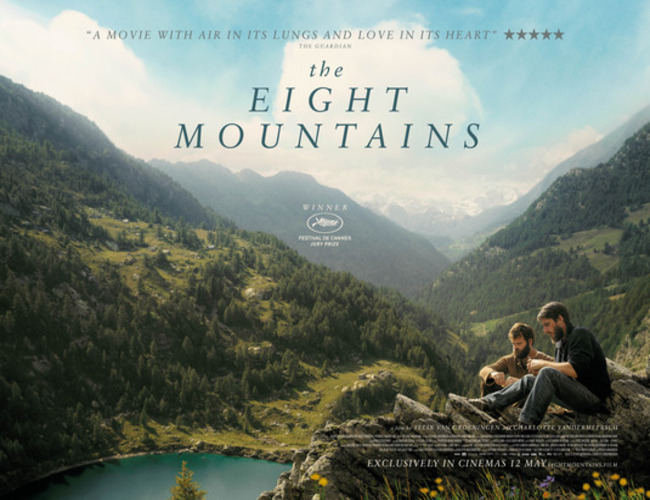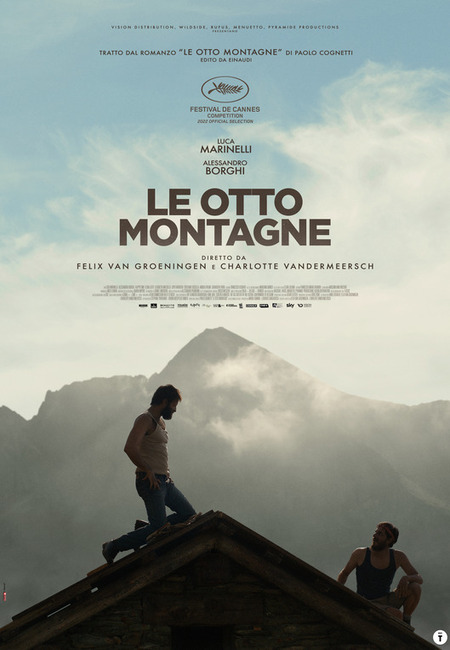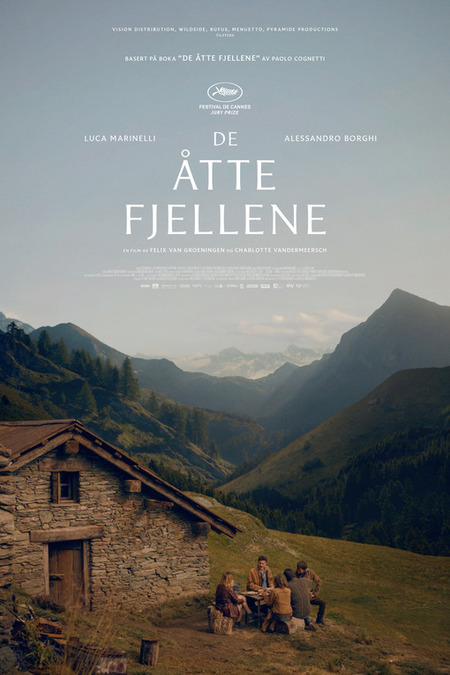(courtesy IMP Awards)
At one key point in this quietly immersive but immensely emotionally powerful film, one of the two men, Pietro aka Berio (Luca Marinelli), whose lifelong friendship forms the beating hear of Le Otto Montagne (The Eight Mountains) admits that he and his bestie Bruno (Alessandro Borghi) are “quiet men” and that his mother Francesca (Elena Lietti) is well used to living among them.
It’s no necessarily a positive moment of recognition; in the wake of the estrangement of Bruno from his partner Lara (Elisabetta Mazzullo), he is observing that there is an epidemic of emotional reticence among the men in his world, including himself, and that this means that a great many things that need to be said go unspoken to the detriment of everyone involved.
In fact, when Pietro does bravely speak some words of truth to his best friend, calling on him to expand his world beyond the mountains he feels safe in – having barely survived an abusive father and an indifferent uncle and aunt, Bruno finds solace in the quiet sparseness of a rugged and remote landscape of the Italian Alps near a small, very small, town, called Grana.
You could well describe the mountains, with which Pietro has both a love and a hate – he adores as a 12-year-old escaping the noisy mess of Turin, his home, but can’t quite feel at home there as Bruno does – as a prison and a sanctuary for Bruno who opens his new friend’s eyes to a place that defies the urbanity with which he’s been most familiar to this point in his life.
Based on the book of the same name by Le otto montagne by Paolo Cognetti, The Eight Mountains asks some fairly potent questions, not simply about the way in which men choose to relate to one another, with so much left unsaid even as a great deal is silently expressed, but how the places to which we belong can be both comfort and a torment.
(courtesy IMP Awards)
This is distilled most affectingly in the friendship between Pietro and Bruno, but also in the way in which Pietro relates to his father Giovanni (Filippo Timi), a man who, the book reveals was born in the mountains and who possesses an almost obsessive love of the fearsomely tall mountains that terrify a young Pietro but which enthrall Giovanni and Bruno who, during a period of estrangement between father and son, develop a closeness and a sense of ease in the natural landscape that Pietro only comes to fully appreciate much later in life.
Central to the storyline in both book and film is the relationship between father and son but while the book beautifully expresses the way in which Pietro struggles to find common ground with his loving but obsessively remote father, the film glosses over this leaving the eventual estrangement, which is filled by Giovanni’s close fatherly friendship with Bruno, feeling all too sudden and under-explained.
But while The Eight Mountains goes a little too scant on why Pietro feels an aloofness to nature and his father who finds himself most at home there – it’s only work that keeps him in Turin and it’s clear it’s not where he wants to be nor where he feels most at home – where it excels is the way in which an adult Pietro, whose finds purpose, love and meaning high in the equally as intimidating mountains of Nepal, comes to find some accommodation and closeness with the memory of his father.
It’s these two key male relationships, between father and son, and most enduringly, Bruno and Pietro that form the emotional backbone of a film that understands that we don’t always say exactly what’s on our minds and that as a result, too many things go unsaid that could have made a real difference.
The film’s ending underscores this with such emotionally nuanced force although fortunately, in their own awkward but heartfelt way Pietro, newly awakened to human connection by his new career as an author and his home in Nepal, they do come to communicate exactly what each means to the other.
(courtesy IMP Awards)
The motif used to show the men’s closeness is the barma or mountain home they work to restore after Pietro’s father bequeathes it to him, a project which Pietro is reluctant to take on at first and which, even after considerable work, he finds simultaenously a place of safety and a reminder of the regrets and failures of his life, but which becomes Bruno’s salvation and possibly his albatross around his neck.
In a movie concerned heavily with how place defines us to a liberating or captivating degree, we see again and again how one person’s place of solitude and restoration is another’s limiting landscape, and how the very place that offers us safety might actually also cage us in.
Quiet and reverently ruminative, and making immersive use of a wild and enthralling environment, which enforces a quiet soulfulness on the film which is most at home inhabiting the in-between times where not a lot is said but volumes are communicated, The Eight Mountains is a story that understands how much is expressed when we are simply present.
Having said that, it also knows the cost that comes from not saying what’s on your heart out loud and how this can limit life and relationships and place a fatal hold on making the most of the possibilities that being alive often grants us.
Both a source of sanctuary and hope, and a place of missed opportunity in certain respects, the friendship between Pietro and Bruno is touching, intimate in the richest platonic sense and likely the closest either man ever gets to truly baring their souls.
The Eight Mountains is a beautifully, exquisitely compelling film that may skip a little too much over some of the expositional childhood elements that would have added extra layer and depth to what takes places later in life between the two men, but which ultimately affirms the power of connection and place and how what is one person’s lifelong home may be another’s bewilderingly uncertain torment, even if by the end, they come to appreciate what it is that really drew them there in the first place.


